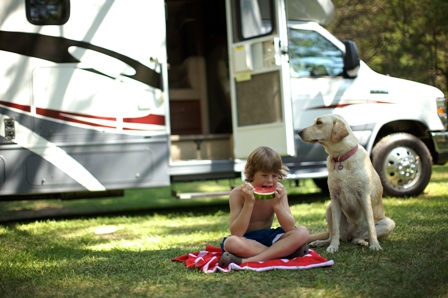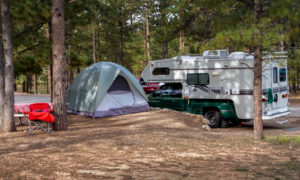
 With more and more campgrounds accepting pets and offering on-site pet amenities, more pets than ever are being included on camping trips. Camping with pets can be a very enjoyable experience for both pet owners and their animals with a little preparation and planning.
With more and more campgrounds accepting pets and offering on-site pet amenities, more pets than ever are being included on camping trips. Camping with pets can be a very enjoyable experience for both pet owners and their animals with a little preparation and planning.
While camping can be a very affordable vacation option, being able to bring pets eliminates the need for a boarding facility. Owners and pets can enjoy their vacation together, an experience that isnt always available on different types of vacations, like a cruise or stay at an upscale resort.
Sylvia Leggett, who owns Roberts Knoll Campground in Alton, N.H., and is a member of the New Hampshire Campground Owners Association Board of Directors, has been camping with her golden retrievers for many years. Leggett has noticed an increase in the number of campgrounds in New Hampshire and beyond that allow pets, with many adding pet-friendly services. She also has some great advice for pet owners who are interested in camping with their pets.
A lot more campgrounds are catering to dogs, Leggett said. Thats why many people camp, so they can be outdoors and keep their pets with them.
Leo Spencer, owner of Chocorua Camping Village in Tamworth, N.H., agrees, noting he has seen the number of owners camping with their pets increase within the last decade. Chocorua Camping Village was one of the first New Hampshire locations to offer a dog park and has since added additional amenities, which Spencer said has garnered very positive responses from campers and keeps them coming back year after year.
We have had dogs all our life. We take a special effort to accommodate guests with pets and have gotten a great response from campers, he said. This is an area where we can offer something special.
While being able to bring pets along can eliminate the need for a dog sitter or kennel, it does require some advanced planning on the owners part to make sure they are prepared for all situations. Only friendly, non-aggressive dogs should be brought to campgrounds, especially during busy times when there will be lots of people, activity and other dogs. While some campgrounds now have on-site kennel services, including Chocorua Camping Village, more aggressive animals should be brought to nearby off-site doggy daycare facilities with professionals trained to handle them.
Dogs aren’t the only pets campers bring along. Leggett has seen campers bring birds and cats, though extra caution should be taken to make sure they don’t get lost while camping.
When camping with a pet for the first time, Leggett recommends planning a shorter trip so the animal can get used to being away from home. That way, the trip can be ended early if needed.
“Stay close to home the first time,” she said. ”You will also need to be much more attentive to the animal.”
There are several resources available to pet owners looking to camp with their pets. Leggett recommends Dogfriendly.com, which lists campgrounds and RV parks that allow pets, and Dogpark.com, which includes listings of dog parks.
The N.H. Loves Campers Guide, published by the N.H. Campground Owners Association, also lists New Hampshire locations where leashed pets are welcome. When making a reservation, its a good idea to mention pets are part of your group. Some campgrounds can offer a campsite further away from busy areas, which may be more comfortable for some pets. Other campgrounds have a restriction on the number of pets allowed per campsite, which is helpful information for pet owners looking to bring more than one animal along.
Leggett carries an old atlas with notes of places where it is safe to stop with dogs, as she camps with three golden retrievers after her campground is closed for the season. Her notes include not only rest areas, but dog-friendly parks, schools and other locations where they can safely stop for a break while traveling to their destination.
Many campgrounds require proof of vaccines against rabies and Bordetella, a type of bacteria, though calling the campground ahead of time to confirm is suggested. Leggett recommends copying vet records with proof of all current vaccines and making sure licenses and contact information are included on pets collars. While all of her dogs are micro chipped, Leggett also has her phone number embroidered into her dogs collars in the event that they ever became separated. Researching veterinarians and emergency services near campgrounds can add extra peace of mind in the event of an emergency.
When it comes to packing for pets, in addition to vet records, its important to remember food and water dishes, an extra collar and leash, medicines or supplements, brushes, tie outs, shampoo, and something from home, like a toy or blanket. If a dog is comfortable sleeping in a crate at home, that should be brought along too. Small dog owners may also consider a pen their dog can stay in while they are at their campsite. Whatever a pet is used to in its daily routine at home should be packed as needed to keep it safe and comfortable during the duration of the camping trip.
After settling into a camp or RV site with pets, it is important to be a responsible camper and pet owner. This includes cleaning up after pets, keeping them leashed and making sure they stay out of prohibited areas. While many places to not allow pets in the pool or in public beach areas, some have dog parks where they can run and play off leash, canine-friendly swimming areas and dog-friendly wash areas.
Leggetts own campground includes a dog park, where owners coordinate doggy play dates and take their pets to a designated wash area if they get dirty. Some campgrounds also have access to walking or hiking trails where it may be safe to let dogs off leash at the discretion of the owner.
Chocorua Camping Village has had a dog park for about 10 years now, but an AKC agility course was added about four years ago. The course contains a series of obstacles that anyone can use. In addition, there is a dog pond where dogs can swim and play fetch off leash, a dog wash station and access to five miles of walking trails. Pet themed events are held at the campground during the summer to include a pet parade.
Spencer said he visited a dog park in Miami years ago and knew it would be a great option for New Hampshire campers.
I thought that was an excellent idea for a campground, he said. Our pet-friendly offerings are very popular. Some guests come specifically for that.
Chocorua Camping Village also has eight day-kennels staffed with an attendant so owners can go on day trips without worrying about their pets.
They can leave their pet with our attendant and take a trip shopping or visit one of the other area attractions, Spencer said. Upon owner approval, the pets are socialized and exercised during the day at the dog park.
While not all campgrounds offer on-site boarding, most can suggest a nearby kennel. Pets shouldnt be left alone either in a tent, camper or tied up outside while owners are away, as they can bark, disturb other campers or injure themselves by getting tangled. Temperature is another factor for pets, as leaving them in a hot vehicle can be deadly.
When in doubt, do not leave pets unsupervised in an unfamiliar environment, as pets may act differently than they do at home.
As other places add pet-friendly amenities, it is getting more convenient for pet owners to bring their pets along. Many campgrounds can offer suggestions on places to visit with pets, from nearby hiking or walking trails to stores. Chocorua Camping Village directs pet owners to Four Your Paws Only, a nearby shop in North Conway that offers dogs a special treat when they visit and owners a discount on their purchases.
Like Leggett suggests, if you plan ahead and are prepared, camping can be a rewarding, memorable experience for both owners and pets.
SOURCE: New Hampshire Campground Owners Association press release






